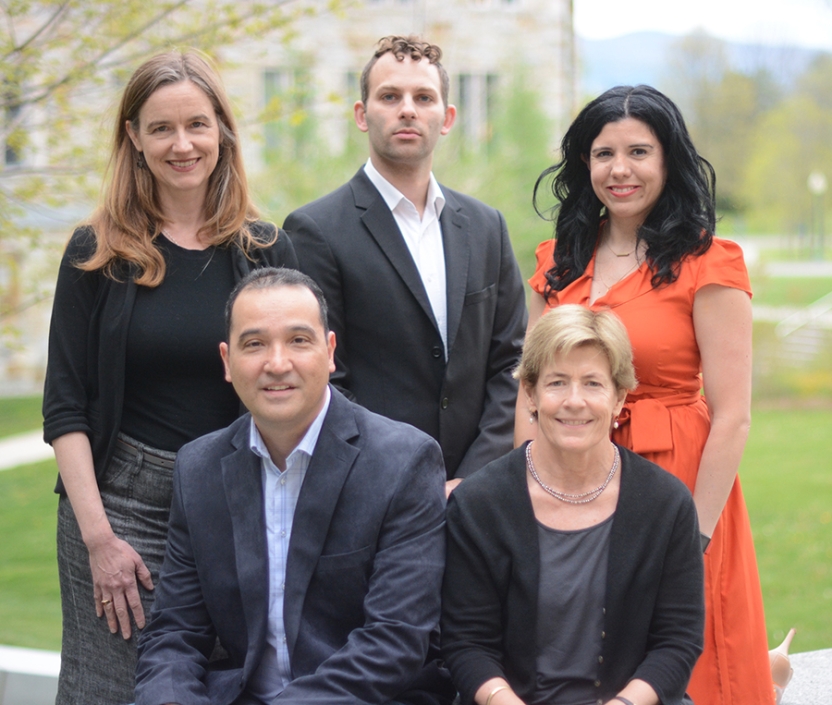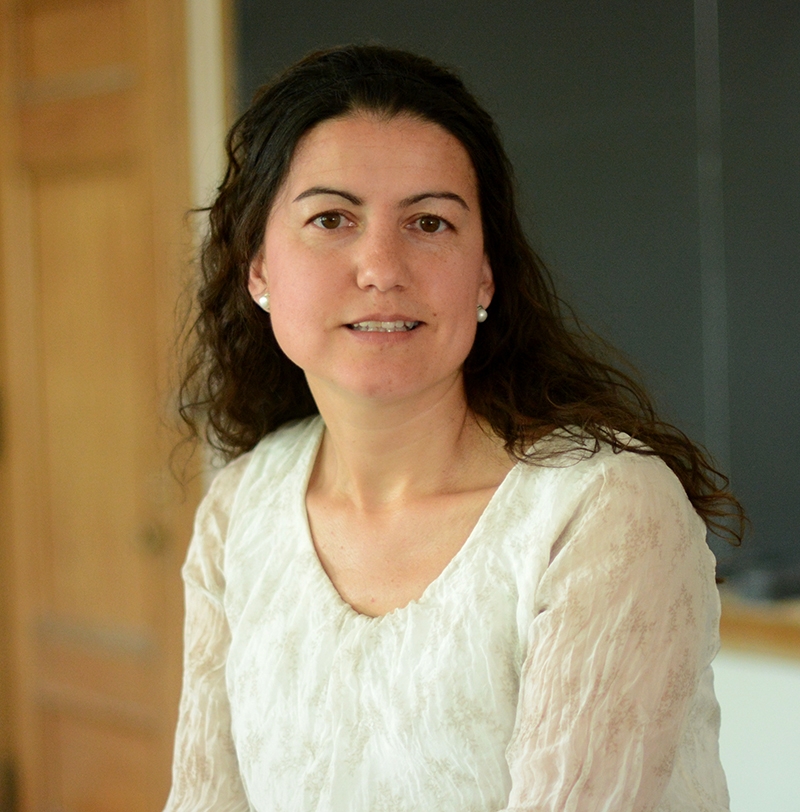College Grants Tenure to Six Members of the Faculty

MIDDLEBURY, Vt. – Six members of the Middlebury College faculty have been promoted to the rank of associate professor without limit of tenure.
On May 14, 2016, the Middlebury Board of Trustees accepted the recommendations of President Laurie L. Patton and the College Board of Overseers in promoting: Leticia Arroyo Abad (economics), Mario A. Higa (Portuguese), Marta Manrique-Gomez (Spanish), Marybeth E. Nevins (anthropology), Edward A. Vazquez (history of art and architecture), and Linda E. White (Japanese studies).
The promotions from assistant professor to associate professor will take effect July 1, 2016.
Leticia Arroyo Abad of the Department of Economics is a leading scholar of the economic history of Latin America and the Caribbean whose recent article in the Journal of Economic History has fundamentally altered the nature of debates about the roots of inequality in Latin America. A member of the Middlebury faculty since 2009, she is a dedicated teacher who strives to foster in her students the core liberal-arts capacities of critical thinking skills, constructing and evaluating arguments, and assessing empirical evidence.
Arroyo Abad’s work outside the classroom, particularly with students from underrepresented backgrounds, has had a transformative effect on the Middlebury community, said Andrea Lloyd, vice president for academic affairs and dean of the faculty. Originally from Argentina, Arroyo Abad has a B.A. in economics from Argentine Catholic University, an M.A. in Latin American studies from University of Kansas, and an M.A. and Ph.D. in economics from University of California, Davis. She received a National Science Foundation grant in 2012
Mario A. Higa had about 10 years of university-level teaching experience before joining the Middlebury faculty in 2009. As a professor of Portuguese language and literature Higa is “like a maestro in front of the class, creating an atmosphere of infectious enthusiasm that motivates students to learn,” said Lloyd. His lectures captivate students transporting them to other times and places, and his empathy for undergraduates allows him to correct his students calmly and patiently while allowing them to see that linguistic errors are both natural and necessary in language learning.
A highly regarded scholar of Luso-Brazilian studies, Higa possesses deep knowledge of the literature of Portugal and Brazil, and has mastery of the broad array of theoretical frameworks used in close readings of literature. He has two works in progress: “Literature and Otherness,” and “A Thematic History of Brazilian Literature.” Higa earned a B.A. in Portuguese and English from Universidade Católica de Santos, M.A. in Portuguese literature from Universidade de São Paulo, and Ph.D. in Luso-Brazilian literature from University of Texas, Austin.

Marta Manrique-Gómez’s edited volume titled “Madness, Love, and Tragedy in Nineteenth and Twentieth Century Spain” (Cambridge Scholars Publishing, 2013) illustrates how her teaching and scholarship mutually inform one another; the concept for the book emerged from one of her classes and it includes Middlebury College undergraduates as co-authors. Manrique-Gómez’s earlier book, “La recepción de Calderón en el siglo XIX” (Iberoamericana Editorial-Vervuert, 2011), filled an important gap in the story of Calderón’s reception with its careful study of archival sources.
In the classroom, “Marta is a compassionate and understanding professor who fosters an environment in which all students are encouraged to participate in discussions, strive for deeper understanding, and make linguistic achievements,” said Lloyd. She teaches beginning, intermediate, and advanced Spanish language courses, in addition to Spanish Realism, Ideas and Cultures of Spain, and Spanish Identities. A member of the Middlebury faculty since 2009, Manrique-Gómez has a Licenciatura en Humanidades (B.A. equivalent) from Universidad de Castilla La Mancha, and an M.A. and Ph.D. in Hispanic studies from McGill University.
Marybeth E. Nevins is “a deeply knowledgeable, patient, and accessible teacher who brings a contagious passion for linguistic anthropology to the classroom,” said vice president Lloyd. Her classroom is “a place where stories from the field come alive, where student learn not only about linguistic anthropology, but about how to do linguistic anthropology.” Nevins is proficient in both Western Apache and Navaho languages, as well as the extinct Maidu language, and has done fieldwork and published widely about them. Her 2013 book monograph is titled “Lessons from Fort Apache: Beyond Language Endangerment and Maintenance.” Nevin’s passion for giving voice to the full array of perspectives within the communities she studies is considered one of the most significant contributions she has made to her field, said Lloyd.
A graduate of University of California, Santa Cruz, Nevins went on to earn her M.A. and Ph.D. in anthropology at University of Virginia. She was an assistant professor in anthropology at University of Nevada, Reno, for six years before joining the Middlebury faculty in 2013.
Edward A. Vazquez is an historian of modern and contemporary art who is fast becoming a leading expert on the work of American sculptor Fred Sandback. With 16 peer-reviewed journal articles, book chapters, museum texts, and conference presentations about Sandback, in addition to his forthcoming book “Aspects of Fred Sandback’s Sculpture” (University of Chicago Press, 2017), Vazquez’s work adds new dimensions to the understanding of Sandback’s work and how it relates to his contemporaries.
A member of the history of art and architecture faculty at Middlebury since 2009, Vazquez is also an inspiring teacher. “His ability to provide lucid explanations of difficult and abstract material creates a classroom environment that can be esoteric but never inaccessible,” said Lloyd. “He also listens well and gives students space to voice their own thoughts, while gently guiding discussions so they evolve organically and engage all students.” Vazquez earned a bachelor’s degree at New College of Florida, a master’s degree at University of Chicago, and a Ph.D. from Stanford University.
Linda E. White is a leading scholar on koseki, the household registration system in Japan, and is fast becoming a leading authority on political feminism there. Her book manuscript, tentatively titled “Gender and the Koseki in Contemporary Japan,” is widely expected to make important contributions to scholarship on gender and social change in Japan. The vice president, Andi Lloyd, calls White “an ambitious and focused scholar whose dedication to her students is nothing short of exceptional.”
Within the Department of Japanese Studies, White teaches first-year language classes and interdisciplinary courses on Current Social Issues in Japan, Women’s Activism in Japan, and Global Japanese Culture. Her teaching stimulates students to engage deeply and meaningfully with ideas that can feel distant from their own experiences. The recipient of a Fulbright Research Award in 2012, White joined the Middlebury faculty in 2005 as a visiting assistant professor in sociology, anthropology, and women’s and gender studies. She holds a B.A. in psychology from Michigan State University, an M.A. in Asian studies from Cornell University, and both an M.A. and Ph.D. in anthropology from University of Colorado.
In addition to granting tenure to the above members of the faculty, the board of trustees in May promoted two associate professors to the rank of professor. They are Hedya Klein (studio art) and Thomas Van Order (Italian). Their appointments to full professor will take effect July 1, 2016.

